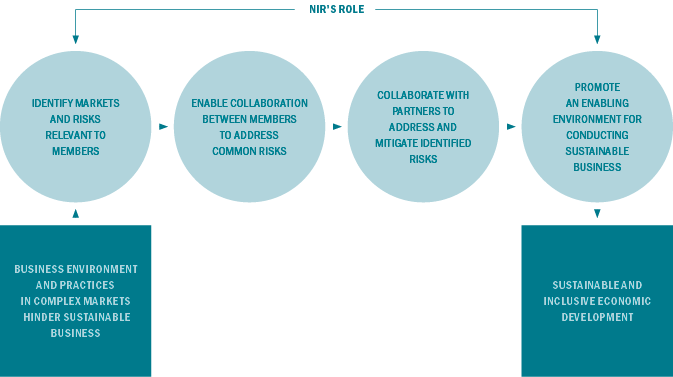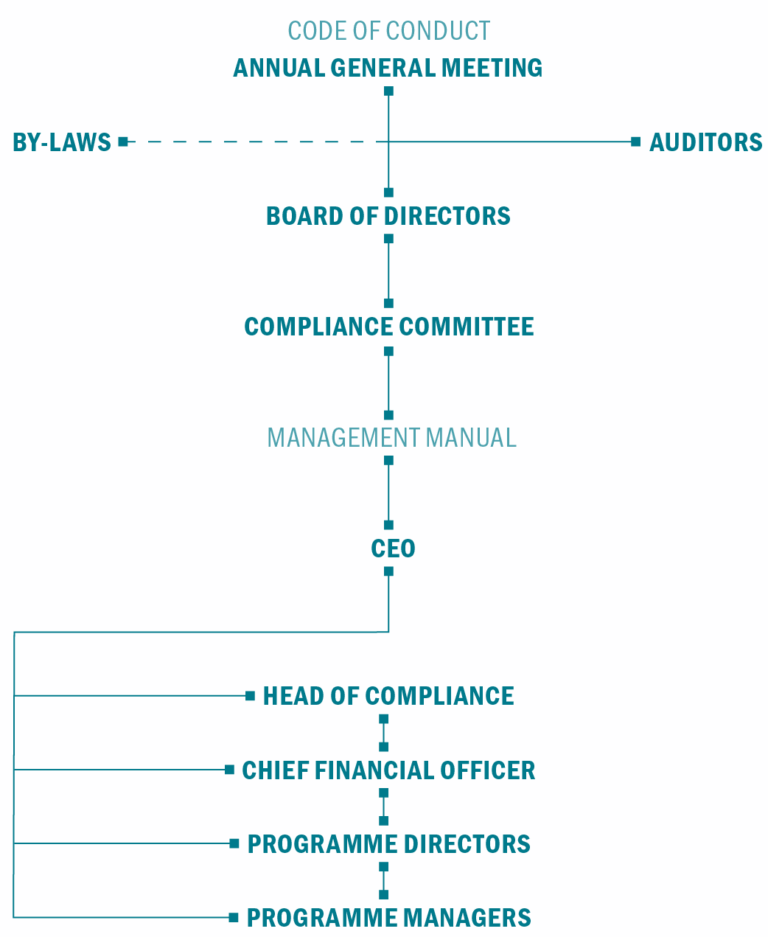We are NIR
In complex markets, factors outside the company’s sphere of influence often limit the capacity to single-handedly manage risks and make positive change. Partnerships create opportunities to take a joint approach to risk management, leveraging better outcomes for people and planet.
NIR's role
By combining the responsible business conduct efforts of companies with a broader development agenda, we leverage efforts to promote labour and human rights along with environmental sustainability.
Our Vision
We want to be a “go-to” organisation that the private and public sectors turn to when looking to scale up partnerships in the aid and trade nexus and that Swedish companies turn to when looking to do sustainable business in low- and middle- income countries.
Our Mission
Improve business conditions in complex markets. We are a pioneering and purpose-driven non-profit organisation, owned and governed by our members. Our long-term goal is to improve conditions for doing sustainable business and promote sustainable and inclusive economic development in low- and middle-income countries. We use a joint approach – collaborations and partnerships – to manage risks and promote more responsible business conduct. The result? Better outcomes for people and planet
Since 1960, NIR has worked in countries with higher levels of challenges and risks but that have long-term business potential for Swedish industry. Such challenges and risks have changed over time and the focus on sustainability has become imperative. Today, NIR continues to work in complex markets with a particular focus on sustainability and ESG-related challenges.

NIR is a link between development aid and trade by collaborating with stakeholders, ranging from governments, authorities and academia to non-governmental organisations and companies, both in Sweden and in partner countries. For more than a decade, NIR has collaborated with Swedish and partner country trade unions.
Insights from the private sector on challenges and opportunities lay the foundation for the design and implementation of NIR’s capacity development programmes in OECD-DAC countries. NIR’s external programmes are funded by grants from the Swedish International Development Cooperation Agency (Sida) and the Swedish Ministry for Foreign Affairs.
As a non-profit organisation, NIR is a neutral partner, which contributes to its credibility in partnerships and activities in programme countries.
How we work
The world is facing unprecedented challenges. Businesses, governments, and society must collaboratively navigate an increasingly unpredictable and rapidly evolving global landscape. At the same time, there are significant strategic opportunities to make the green transition sustainable and inclusive.
In response, we are working with our members to build strong partnerships that foster synergies between international trade and development cooperation.
Regardless of the business model or industry, companies operating in complex markets face similar challenges. By working together with our members and partners, NIR improves business conditions and supports market development to pave the way for more sustainable business, as well as to increase the demand for sustainable solutions.
NIR is a meeting point for our members by:
- identifying challenges, such as sustainability risks, and opportunities in selected markets;
- facilitating exchange between members on how to effectively manage challenges and risks in complex markets;
- acting as a nexus between the private and public sectors;
- collaborating with partners and stakeholders to improve business conditions in complex markets;
- adding value to the Swedish presence in complex markets; and
- implementing programmes to bring partners and stakeholders together to promote social, environmental and economic sustainability.
Governance Structure
We are a non-profit organisation owned by our members and governed by our Board of Directors, as designated by our
By-Laws.
Members
In accordance with our By-Laws, members must be a legal Swedish entity and do business in complex markets. Doing business means having an own presence in complex markets through sales, sourcing, production and/or financing such business. Membership is decided upon by the Board of Directors. As of 31 December 2024, we had 16 members.
Board of Directors
Our Board of Directors is comprised of a Chair, Vice Chair and a Board Member from each fully paying member. Board members may not be substituted. The members of our Board of Directors are senior ranking representatives with diverse competencies and extensive experience. A diverse and experienced Board of Directors is key for the growth and development of our organisation, offering us a cross-cutting perspective on sustainability issues and adding value to our portfolio.
Hans Holmström
Chair
Henrik Petersson
Vice Chair, SVP President and Head of Corporate Government Relations
Saab
Camilla Goldbeck-Löwe
Vice President Corporate Responsibility
Epiroc
Daniel Lundgren
Commercial Director
Siemens Energy
Anna Medvedeva
Director Sustainability Technology and Strategy
Boliden
Eija Hietavuo
Global VP Corporate Affairs
Tetra Laval Group
Boel Schylander
VP Sustainability
Sandvik Mining and Rock Solutions
Sandvik
Magnus Nordéus
VP Global Risk & Regulatory Policy
Ericsson
Ann-Sofie Zaks
Senior Vice President Human Resources
SKF Group
Anna Sjörén
Vice President Sustainability
Atlas Copco Group
Filip Elveling
Government and Institutional Relations Lead
Hitatchi Energy
Tony Lindström
Head of Finance Sales at Volvo Construction Equipment
Volvo Group
Malin Ekefalk
Head of Social Sustainability
Electrolux Group
Jonas Strömberg
Sustainable Transport Business Manager
Scania Group
Lena Bertilsson
Director and Head of Department – Large Corporates
Exportkreditnämnden (EKN)
Johan Sahlén
Head of Bank and Regional Management Corporate Coverage
SEB
Pontus Davidsson
Head of International Finance
SEK
Photo: Pär Ohlsson
Nominations Committee
Annika Berglund
Retiree, fmr. Chair & Senior Advisor
Paul Palmstedt
Head of External Corporate Communications & Affairs
Electrolux Group
Stefan Karlsson
Chief Economist
EKN
Our team
Our Whistleblower function
A brief history
⦁ Dr Marcus Wallenberg founded NIR in 1960 as the Swedish Industry’s Council for Foreign Affairs.
⦁ NIR’s focus shifted from the European Economic Community in the 1960s to emerging markets in the late 1970s, and then to complex markets in 2006.
⦁ As the boundaries between political and sustainability risks in complex markets are often vague, the focus has shifted towards mitigating risks by promoting sustainability.


